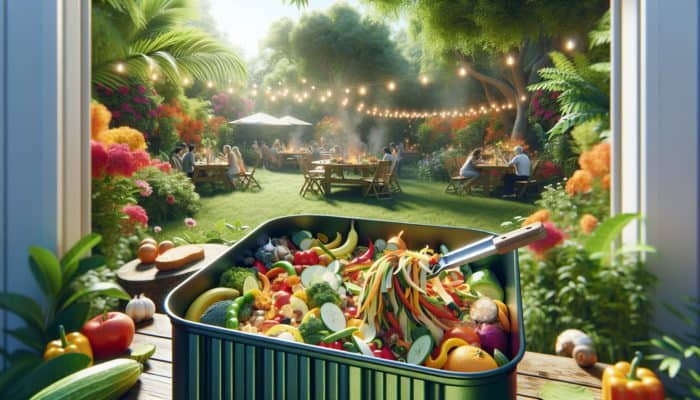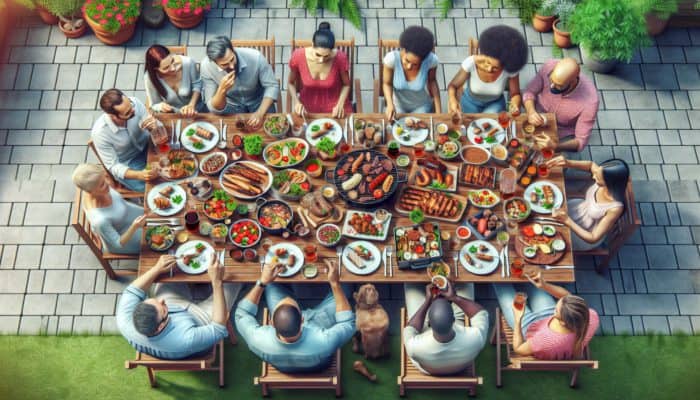Design a Sustainable BBQ Menu to Effectively Reduce Food Waste
Crafting a remarkable BBQ menu extends beyond simply grilling delicious meats and preparing appetising sides; it requires a strategic approach focused on reducing food waste. To begin with, accurately estimating the total number of attendees is vital. This assessment lays the groundwork for determining the right quantity of food to prepare. By employing this proactive strategy, you can drastically minimise the prevalent issue of over-purchasing, which often results in surplus food that contributes to waste. A clever tactic is to meticulously monitor RSVPs, providing insights into your guests' dietary preferences while taking into account any unexpected attendees, thus facilitating more precise and responsible planning.
When selecting your BBQ menu, it is crucial to choose versatile ingredients that can be integrated into various dishes. For example, grilling vibrant vegetables like bell peppers and zucchini opens up numerous possibilities for salads, wraps, or enticing sides. This strategy not only assists in waste reduction but also enhances the overall flavour profile of your BBQ spread. Aim to include complementary ingredients, ensuring that any leftovers can be creatively repurposed in upcoming meals. This approach promotes sustainability and culinary innovation, enabling you to maximise the potential of every ingredient.
A fundamental principle in effectively reducing waste is to prepare only the necessary amount of food. This involves cooking portions that accurately reflect your guest list. A practical guideline suggests preparing approximately one-third less than your estimated needs, ensuring guests are satisfied whilst also minimising leftovers. Iconic BBQ staples like hot dogs can be sliced into smaller, bite-sized pieces, served alongside a diverse assortment of sides, allowing guests to indulge without the risk of overindulging, thereby effectively managing portion sizes and reducing waste.
Furthermore, it is essential to consider your guests' dietary restrictions to ensure everyone can enjoy the BBQ without contributing to unnecessary waste. By offering a diverse range of options, including vegan dishes or gluten-free sides, you cater to a wider audience and diminish the chances of untouched meals. This considerate approach fosters an inclusive atmosphere, encouraging all guests to appreciate what is available, thereby further decreasing the likelihood of waste.
By implementing these strategic measures, you are not only hosting a delightful BBQ; you are also taking responsible steps towards learning how to minimise BBQ food waste while creating a memorable experience for your attendees. This conscious effort elevates the enjoyment of the food and demonstrates a commitment to environmental mindfulness and sustainable practices.
Effective Shopping Strategies for Mastering Food Waste Reduction at Your BBQ

Efficient shopping is foundational to hosting a successful BBQ while significantly reducing food waste. Initiate your shopping journey by sourcing fresh, local produce. By selecting seasonal ingredients from nearby farmers, you not only support your local community but also ensure the quality and freshness of your purchases, which are less likely to spoil quickly. Visiting your local farmers' market is a delightful way to discover colourful fruits and vegetables that not only taste superior but also require less transportation, thereby lessening your environmental impact and carbon footprint.
Be on the lookout for discounts on items that can be frozen or preserved for future use. Snagging deals on meats or vegetables that can be stored for later meals is a savvy approach to saving money while simultaneously reducing waste. Investing in vacuum-sealing bags is an excellent tactic, as they can significantly extend the shelf life of meats, allowing you to buy in bulk without the anxiety of spoilage. This proactive shopping approach is a key step in understanding how to minimise BBQ food waste while remaining budget-friendly and effective.
To avoid the common pitfalls of overbuying, adhere closely to your shopping list. Before heading out, thoroughly plan your menu and create a detailed list of all necessary ingredients. This practice can drastically limit impulse purchases, which often lead to excess food. Furthermore, consider buying in bulk for frequently used items such as spices and condiments; this method can be both cost-effective and aligned with your waste reduction goals.
Meal planning in advance serves as another effective technique. By outlining your menu and preparing a detailed shopping list based on your requirements, you can ensure that every ingredient has a significant purpose, thus minimising the risk of waste. Additionally, consider prepping items ahead of time, which not only streamlines the cooking process on BBQ day but also promotes the efficient use of ingredients throughout the week, preventing unnecessary spoilage and waste.
Smart shopping is a crucial component of hosting a BBQ that prioritises sustainability. When approached thoughtfully, it can create a ripple effect that reduces waste while positively impacting the environment, all while ensuring a memorable experience for every attendee at your event.
Enhance Food Storage Techniques to Improve Waste Management at Your BBQ
Effective food storage is essential for prolonging the shelf life of leftovers and minimising waste. Start by investing in high-quality, airtight containers that preserve freshness and prevent your food from absorbing unpleasant odours from the refrigerator, which can alter its flavour. Allocate specific containers for marinated items to ensure they are stored separately, thus maintaining their unique flavours and enhancing the overall quality of your meals.
Labelling and dating your food is a transformative practice that plays a crucial role in effective waste management. Clear labels assist everyone in your household in recognising what’s in the fridge and when it should be consumed—this clarity reduces confusion and ensures that leftovers are enjoyed before they spoil. As you prepare for your BBQ, take a moment to label the containers with the date and contents immediately after cooking, making it easy to monitor freshness and use items in a timely manner.
Another key aspect of proper food storage is the clear separation between raw and cooked foods. This practice not only prevents cross-contamination, which poses health risks, but also aids in minimising unnecessary waste. Store raw meats on the bottom shelf of your refrigerator, ensuring that any drippings do not contaminate other foods. Cooked items should always be kept above raw ingredients, ensuring they remain safe, sanitary, and appetising for your guests to enjoy.
By mastering the art of food storage, you not only extend the life of your BBQ leftovers but also significantly lessen your environmental impact. Once you have an effective system in place, you'll be well on your way to understanding how to minimise BBQ food waste efficiently, ensuring that every last bite is cherished and appreciated, contributing to a more sustainable lifestyle.
Unleash Your Culinary Creativity with Leftovers to Effectively Reduce Food Waste
Leftovers can be transformed into exciting new meals rather than being left to languish in the back of the fridge. Start by unleashing your culinary creativity—leftover grilled chicken can be shredded and incorporated into vibrant salads or mixed with barbecue sauce for delicious sandwiches or wraps. This not only adds variety to your meals but also prevents that forlorn food from going to waste, allowing you to savour your BBQ creations for an extended duration.
Another fantastic strategy is to freeze any unused portions. Foods such as cooked meats and grilled vegetables freeze beautifully and can be conveniently utilised in future meals, extending their usability beyond the BBQ event. Remember to portion these items into meal-sized servings before freezing, as this makes them perfect for quick dinners. This technique is particularly beneficial on busy weeknights when you wish to minimise cooking time while still enjoying flavourful dishes that remind you of your BBQ gathering.
Consider donating any unspoiled leftovers to local food banks or organisations that assist those in need. Many communities have food recovery programmes that can efficiently distribute your surplus food to families who can utilise it, making it an easy way to give back while effectively managing waste. This practice is gaining popularity as a means to learn how to minimise BBQ food waste while contributing positively to your community.
Repurposing leftovers goes beyond merely creating new meals; it fosters a culture of sustainability. By encouraging your family and friends to think creatively about food, you contribute to a broader movement aimed at reducing waste across communities. Your efforts can inspire others to adopt similar practices, amplifying the impact of your initiatives and nurturing a more sustainable society.
By embracing these creative strategies, you can ensure that your BBQ is not only a celebration of good food and camaraderie but also a conscious effort towards sustainability and waste reduction, showcasing the importance of being resourceful.
Implement Composting Practices for a Greener BBQ Experience

Composting is one of the most effective methods to minimise BBQ food waste while positively impacting the environment. Setting up a compost bin is straightforward and requires minimal effort, making it an essential addition for any BBQ host. By designating a specific area for food scraps, you can easily dispose of organic waste—such as vegetable peels, fruit scraps, and leftover greens—transforming what would otherwise be trash into nutrient-rich compost that benefits your garden and enriches the soil.
Educating your guests about composting can significantly enhance your BBQ experience. Place informative signs around your compost bin that explain what can and cannot be composted, encouraging participation from everyone. This initiative not only aids in reducing waste but also raises awareness about sustainability efforts within your community, fostering a collective consciousness regarding environmental responsibility and stewardship.
Utilising compost in your gardening can be an incredibly gratifying experience. Applying nutrient-dense compost to your garden improves soil health and promotes robust plant growth. This cycle reinforces the benefits of composting, illustrating how food waste can nourish the earth rather than adding to landfills, thereby contributing to a healthier ecosystem and supporting biodiversity.
Encouraging a culture of composting at your BBQ doesn’t require a large investment of time or resources. With a little guidance, you can demonstrate to your guests how easy it is to participate in sustainable practices, fostering a sense of community around waste reduction. The journey toward understanding how to minimise BBQ food waste becomes a shared experience that extends beyond the grill and into everyday life, creating lasting habits.
By adopting composting practices, you’re not only enhancing your BBQ but also contributing to a cleaner environment, ensuring your event is a step toward sustainable living and responsible waste management, ultimately making a positive difference.
Inspire and Empower Your Guests for Lasting Change in Food Waste Reduction
Education serves as a powerful instrument in the fight against food waste. Sharing effective waste reduction techniques during your BBQ can empower your guests to incorporate these practices into their own lives. Utilise your gathering as a platform to discuss the significance of minimising food waste, highlighting your strategies for planning, shopping, storing, and composting effectively. This collaborative approach can instil a sense of responsibility and awareness among your attendees, encouraging them to embrace sustainable practices in their everyday lives.
Leading by example sends a strong message. Demonstrate waste-reducing practices throughout your BBQ, whether by showing how to creatively repurpose leftovers or discussing thoughtful ingredient selections. When guests observe these strategies in action, they’re more inclined to adopt similar habits in their own kitchens, creating a ripple effect of sustainability that extends far beyond your gathering.
Promoting sustainable practices beyond the BBQ can have a lasting impact. Encourage your guests to implement small changes in their daily routines, such as meal planning or developing a composting system. These adjustments can significantly reduce household waste and cultivate a culture of sustainability that extends well beyond your event, creating a community that values eco-friendly practices and accountability.
Consider hosting workshops on sustainability during your BBQ for an added layer of engagement. Set aside time to introduce informative sessions that teach guests more about sustainable living and waste management techniques. Topics might include effective composting methods, strategies for minimising food waste, or even gardening techniques that utilise compost, thus fostering a holistic understanding of sustainability and responsible consumption.
Creating a sustainability pledge can further reinforce these efforts. Encourage your guests to sign a pledge committing to sustainable actions at home and during future events. This practice not only keeps the conversation alive but also fosters accountability within your social circle, helping to sustain the momentum toward a more sustainable lifestyle and community engagement.
Incorporating education and encouragement into your BBQ experience enhances the overall event while positioning you as a leader in the critical conversation surrounding food waste reduction. When your guests depart, they carry with them not just fond memories of delicious food but also a commitment to sustainable practices, thus effectively understanding how to minimise BBQ food waste in their everyday lives and inspiring change in their communities.
Frequently Asked Questions About Effective BBQ Food Waste Reduction
What is the best strategy for planning a BBQ menu to avoid food waste?

Planning a BBQ menu efficiently requires an accurate assessment of guest numbers, selecting versatile ingredients, and preparing just enough food to match attendance while taking dietary restrictions into account. This thoughtful approach ensures that all guests can savour the offerings while reducing unnecessary waste and enhancing the overall enjoyment of the event.
How can I ensure I only buy what I need for my BBQ?
Stick to a detailed shopping list based on your planned menu, prioritise purchases of local produce, and seek out deals on items that can be frozen or utilised later to prevent over-purchasing. This method not only saves money but also aligns with sustainability goals, contributing to a more responsible approach to food consumption.
What are some effective food storage techniques to reduce waste?
Utilise airtight containers for leftovers, label and date items to monitor freshness, and store raw and cooked foods separately to avoid cross-contamination and ensure food safety. These practices collectively contribute to minimising waste and promoting health and safety in your kitchen.
How can I creatively use BBQ leftovers?
Transform BBQ leftovers into exciting meals like sandwiches, salads, or freeze them for future use. Additionally, you can donate unspoiled food to local food banks to assist those in need, thus enhancing community well-being while reducing waste and fostering a culture of giving back.
What should I do with food scraps from my BBQ?
Set up a compost bin for food scraps, educate guests on composting practices, and use the compost in your garden to enhance soil health and support plant growth. This practice not only aids in waste reduction but also enriches your gardening efforts, contributing to a more sustainable environment.
How can I educate my guests about minimising food waste?
Share practical waste reduction tips during the BBQ, demonstrate sustainable practices, and encourage guests to integrate these habits into their daily routines. This engagement can foster a community-wide commitment to sustainability and environmental awareness, encouraging everyone to take action in their own lives.
What impact does composting have on food waste reduction?
Composting effectively transforms food scraps into nutrient-rich soil, significantly reducing landfill waste and promoting a healthier environment through the recycling of organic materials. This practice supports sustainable gardening, enhances ecological health, and contributes to the overall well-being of our planet.
Can I host a workshop during my BBQ?
Absolutely! Consider dedicating time during your BBQ to teach guests about sustainability and waste management practices, enriching the overall experience with educational content that empowers everyone to contribute to environmental stewardship and responsible consumption.
What is a sustainability pledge, and how can it help?
A sustainability pledge is a commitment made by guests to adopt waste-reducing actions at home, fostering accountability and encouraging ongoing sustainable practices. This collaborative effort builds a supportive community dedicated to reducing environmental impact and promoting responsible consumption.
How can I lead by example at my BBQ regarding food waste?
Demonstrate waste-reducing actions, share your knowledge, and encourage participation in sustainable practices throughout your event to inspire your guests to be mindful of food waste and engage in responsible consumption. Leading by example can create a lasting impression and motivate others to follow suit.
Connect with Us on Facebook!
The Article How to Minimise BBQ Food Waste: Smart Strategies appeared first on https://pitmastersarsenal.com
The Article Minimise BBQ Food Waste with Smart Strategies Was Found On https://limitsofstrategy.com
The Article Smart Strategies to Minimise BBQ Food Waste found first on https://electroquench.com

